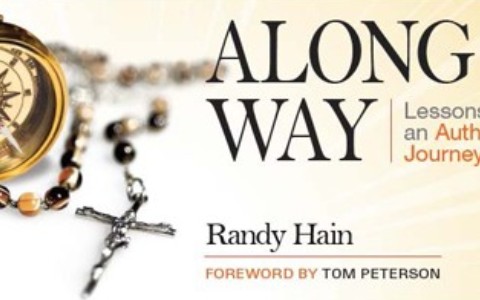
For the last several years, there has been an increased interest in practical advice on how to live the faith. Certainly, the uncertainty and growing chaos in the secular world have something to do with this. More recently, we have seen more obvious clashes between our culture and our Church. We can look back through Salvation History and see the pattern. The answer today, just like in times past, is the same—turn away from sin and towards God. The right path has always been surrender to the One who alone is good and loves you.
We will look at some practical ideas for living our faith, but first, we should listen anew to the words of Jesus…
And he said to his disciples, “Therefore I tell you, do not be anxious about your life, what you shall eat, nor about your body, what you shall put on. For life is more than food, and the body more than clothing. Consider the ravens: they neither sow nor reap, they have neither storehouse nor barn, and yet God feeds them. Of how much more value are you than the birds! And which of you by being anxious can add a cubit to his span of life? If then you are not able to do as small a thing as that, why are you anxious about the rest? Consider the lilies, how they grow; they neither toil nor spin; yet I tell you, even Solomon in all his glory was not arrayed like one of these. But if God so clothes the grass which is alive in the field today and tomorrow is thrown into the oven, how much more will he clothe you, O men of little faith! And do not seek what you are to eat and what you are to drink, nor be of anxious mind. For all the nations of the world seek these things; and your Father knows that you need them. Instead, seek his kingdom, and these things shall be yours as well.
“Fear not, little flock, for it is your Father’s good pleasure to give you the kingdom. Sell your possessions, and give alms; provide yourselves with purses that do not grow old, with a treasure in the heavens that does not fail, where no thief approaches and no moth destroys. For where your treasure is, there will your heart be also.” (Luke 12:22-34)
Jesus reminds us simply that the Father knows what we need and that we must take comfort and hope in the midst of these trying times in the knowledge of who we are and why we are here. God has made us for Himself and desires that we turn to Him. Possibly it is an inner sense of this truth that has so many turning to Him in these troubling times. Over the last few generations, so many have placed their trust in the world… building up treasure and desires for treasure in the world instead of in the Kingdom. The bedrock of the world is now crumbling as it always does, so we turn back to the One who is always faithful, always there with us, even when we are not with Him.
Yes, we have been given talents to make a living in this place of pilgrimage. We have the responsibility to care for the financial well-being of our families—to provide shelter, clothing and food, to save reasonably for that rainy day. Faithfulness to our God includes being responsible for our material needs, but is it not true that the goals so many have set for themselves have sacrificed their relationship with God? So my advice has been to return to God and place Him first. Or as Jesus said above: “Instead, seek his kingdom, and these things shall be yours as well. Fear not, little flock, for it is your Father’s good pleasure to give you the kingdom.”
What is called for is surrender to God with our first cares being those things which are above—holiness and salvation—a life of advancing prayer, a life in which we love God above all and our neighbor as our self.
Practical Ideas for Living the Faith
But the questions always return to the practical, so what follows are ideas for things we can do concretely. What I offer are neither exhaustive of all we should do, nor a list of all things you must do at once.
The following are simply suggestions from which you might choose.
Before we begin with lists, we have our “preflight” checklist—those things that come first. For you to grow in holiness and in faithfulness to God’s will, you must be sure that you are in a “state of grace.” If you are aware of any grave sin in your life, first make a good and humble sacramental Confession. Did I mention “humility”? Saint Teresa of Ávila says that the practice of humility is essential to spiritual growth in holiness. And since practice makes perfect, practice the virtue of humility—make a commitment to do so daily with all you meet and in all circumstances. Do so because you love God and let that love motivate all that follows.
For Your Daily Consideration
Prayer – Do you only talk about God or do you talk with Him?
If we profess to love someone, it is a given that we must spend time with that person. If we do not, and we do not have a good reason for being absent, then the love we profess is not credible. That is true in our human relationships—it is also true in our relationship with God. Daily prayer must be a priority for that is how we, first of all, spend time with God. And as beginners in prayer, our primary expression of prayer ought to be meditation. None of the following prayers take up much time. Indeed, all the prayers combined take up less time than what most spend in front of the television each day.
- A Morning Offering – Upon waking first thing in the morning, before you do anything else, offer a short prayer of thanksgiving to God for seeing you safely through the night and granting you this new day. Offer to Him all your thoughts, words and actions of the coming day to His glory and service. In this way we also make all we do during the day a prayer. This morning offering can be of your own composition or you can use any of the many Morning Offerings that have been recorded and used through our Catholic tradition.
- Acts of Faith, Hope and Charity – these traditional prayers focus on strengthening the supernatural virtues infused in our souls when in a state of grace and are ideal additions to the Morning Offering.
- Rosary – Praying a daily rosary is one of the most important prayers you can offer. It provides an ideal and traditional means of meditation upon the chief events of Our Lord’s life as you recite the vocal prayers of the rosary. In addition to our private prayer, the Rosary is an ideal prayer for the family to practice together—possibly just after the evening family meal.
- Grace before and after meals – Speaking of the family meal, what a wonderful testament of our love of God to give thanks before and after all our meals, both at home and in public. Additionally, these short prayers remind us of our dependence on God.
- Chaplet of Divine Mercy – Using your rosary beads, this chaplet is given to us by Our Lord through Saint Faustina. It only takes a few moments and it is a good practice to pray it at the Hour of Mercy each day—3:00 p.m. Our Lord has said that we live in the time of mercy and that He desires to wash us in an ocean of mercy.
- An Examen – Each day, we should pause to examine how we have lived the day. Take stock of those things you have done well and commit to continue them. Also review those areas where you have sinned or otherwise failed to live as Christ would have you live, turning in repentance to God, asking His forgiveness, resolving to sin no more and asking His grace to help you. This an be done throughout the day or at the end of the day and ordinarily need not take long.
- Night Prayer – At the end of the day, as you turn in for sleep, offer God thanksgiving for the blessings of the day and ask Him to watch over you as you sleep. This is a great time for your daily examen. It is also a time that I include prayers for those who have asked me to pray for them. This might work for you too.
- Liturgy of the Hours – For those who wish to pray daily with the Church using her liturgical prayer, you can pray the Breviary—Morning and Evening Prayer at the least.
Daily Mass – For those whose schedules permit, assisting at daily Mass. The Holy Mass is the greatest and most powerful of all prayer. It is a great privilege to be able to take part in the heavenly liturgy and to receive Our Lord in Holy Communion.
Spiritual Reading – I know it seems like a lot, but if you look at how you spend your day, might there not be some change or sacrifice you can make to spend at least 15 minutes reading a passage of Scripture or an episode of summary from the lives of the Saints? Such reading, done not just academically, but prayerfully as a devotion, provides added opportunity for prayerful meditation.
Help Someone in Need – Commit to “being Christ” to another each day. A smile offered, patience in listening to another, a word of encouragement to someone who is troubled… these and so many other opportunities are presented to you each day by the Good God. Commit not to waste them. And don’t forget that our works of mercy might include witnessing for Christ in word as well as action. Do not be afraid to share the good news of Jesus Christ that is the reason for the joy that is in you. You might even be able to invite someone to Mass or a bible study at your local parish.
For your Weekly Consideration
Holy Mass – First of all, make sure to keep holy the Lord’s day and all Holy Days of Obligation by assisting at Holy Mass and refraining from servile work. We are called to be active participants at Mass, most of all by our interior dispositions and attachments to the liturgical prayers and actions. Make sure you prepare for Mass in advance through a prayer of recollection and arriving on time and not leaving early. Including the Mass readings as a part of your daily spiritual reading and meditation is a good idea. Also, if you are unable to attend daily Mass, try adding one Mass each week on a day when you are not obligated to attend.
Practice Penance on Fridays – Although we no longer require in the United States to abstain from meat on Fridays outside of Lent, this is still the ordinary means of practicing penance on Fridays. You may choose to substitute some other act of sacrifice or penance, but be sure you choose something that is meaningful. You might, for example, add special prayers for the day or perform some Corporal Work of Mercy, such as visiting the sick or shut-ins.
Chaplet of Divine Mercy – If you have not been able to include a Divine Mercy chaplet in your daily prayer, consider praying the chaplet at the Hour of Mercy (3:00 p.m.) each Friday, recalling the Sacrifice of the Cross.
Way of the Cross – Praying the stations of the cross, in church before the stations or in your home, particularly on Fridays is a good weekly activity that reminds us of the example of love and humility that Our Lord endured out of love for you. This is another excellent and traditional opportunity for meditation in your prayer life.
Adoration of the Blessed Sacrament – Pope Benedict XVI, like his predecessor, Saint John Paul II, strongly encourages both individual and community adoration of the Blessed Sacrament. Find a parish that offers perpetual or regularly scheduled adoration of the Blessed Sacrament and sign-up to be a guardian of an hour with the Lord each week. This hour of adoration can be an effective extension of your interior participation in the Sacrifice of the Mass.
Spiritual Reading – See Daily… if you are unable to commit to daily spiritual reading, then commit to setting aside a period of time, say 30 minutes to an hour, to engage in devotional reading of Scripture, the Lives of the Saints, or other devotional reading.
Attend an Adult Education Class – Most parishes offer some opportunity for adult education of faith enrichment. Take a look at what your parish offers, even if only a virtual gathering, and get involved.
For your Monthly Consideration
First Friday or First Saturday Devotion – Learn about devotion to the Sacred Heart of Jesus and the Immaculate Heart of Mary and make the traditional First Friday and/or First Saturday devotions.
Sacramental Confession – Make a good sacramental confession at least once each month, even if you are not aware of having the guilt of mortal sin. Each sacrament has a grace particular to it. Confession offers the grace to be able to avoid serious sin.
Service and Detachment – God calls us to love Him above all else and to love one another. In addition to the daily practice of “being Christ” to someone God has placed in your life, consider joining a ministry that reaches out to those in need through corporal works of mercy. This may involve visiting the sick, the homeless or those in prison. Monthly volunteer service at a “soup kitchen” might be a good choice. Or providing meals to the home bound. We all have busy lives, but that does not excuse us from ministering to those in need. The inclination might be to write a check, but being present and actually serving in person through your presence is needed too. And this is a great way to spend time together as a family and a great example for your children.
It must be realized that too many of us suffer from disordered attachments to the things of this world. In considering how we can give of ourselves and our treasure to those in need, it is a good idea to combine that with practicing detachment through self-denial of things we crave too much. The time and money saved can thus be redirected to our service. While we might set aside a portion of one day each month to serve others, we should practice detachment daily in some tangible way… cut down on television, reduce or eliminate the purchase of unneeded items, etc.
For your Annual Consideration
Spiritual Retreat – Each of us is in need of some time away from the daily life to spend time alone with the Lord. Making an annual spiritual retreat at a local monastery or retreat house can provide just the opportunity to recharge and secure the spiritual progress made in the preceding year. Personally, I prefer directed, silent retreats, but there are a variety of retreats offered in many places from which to choose.
Done for love of God
No matter what concrete areas you choose from the above list or from somewhere else, make sure that all you do is not done simply as some kind of item to be checked off a list. Nothing we do is meritorious for ourselves in the order of grace unless they are performed out of an ever deepening love for God. And even what we do for others is more effective when motivated by love of God and while reconciled to Him… “the prayers of a righteous man availeth much.”
May God Bless you on your journey of faith as you travel to your heavenly home.
Into the deep…
Deacon Bickerstaff is available to speak at your parish or event. Be sure to check out his Speaker Page to learn more. Into the Deep is a regular feature of the The Integrated Catholic Life™.
 Help spread the Gospel. Please share this article on Facebook and other social media.
Help spread the Gospel. Please share this article on Facebook and other social media.













